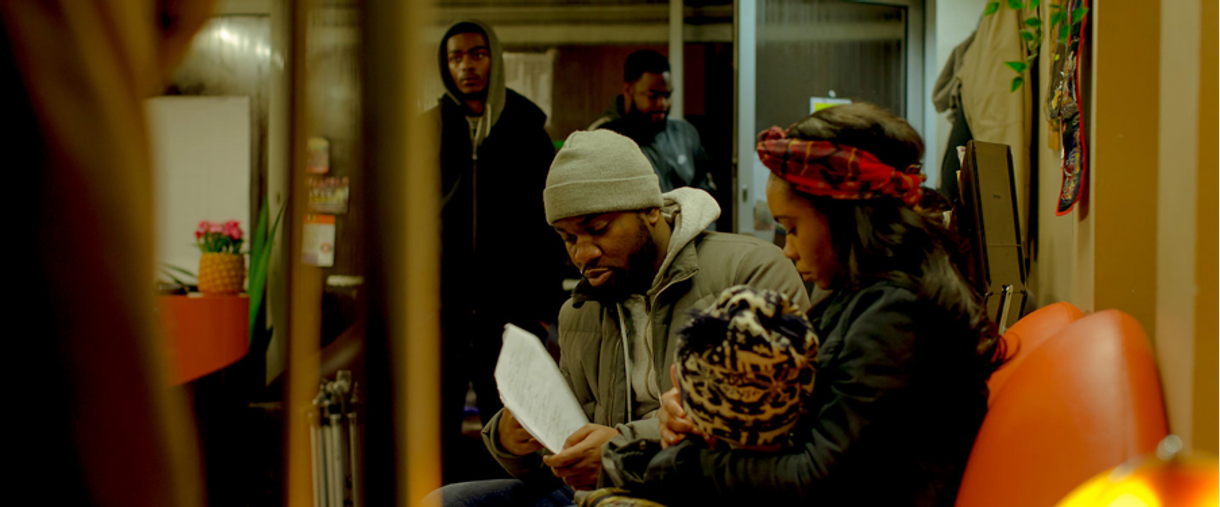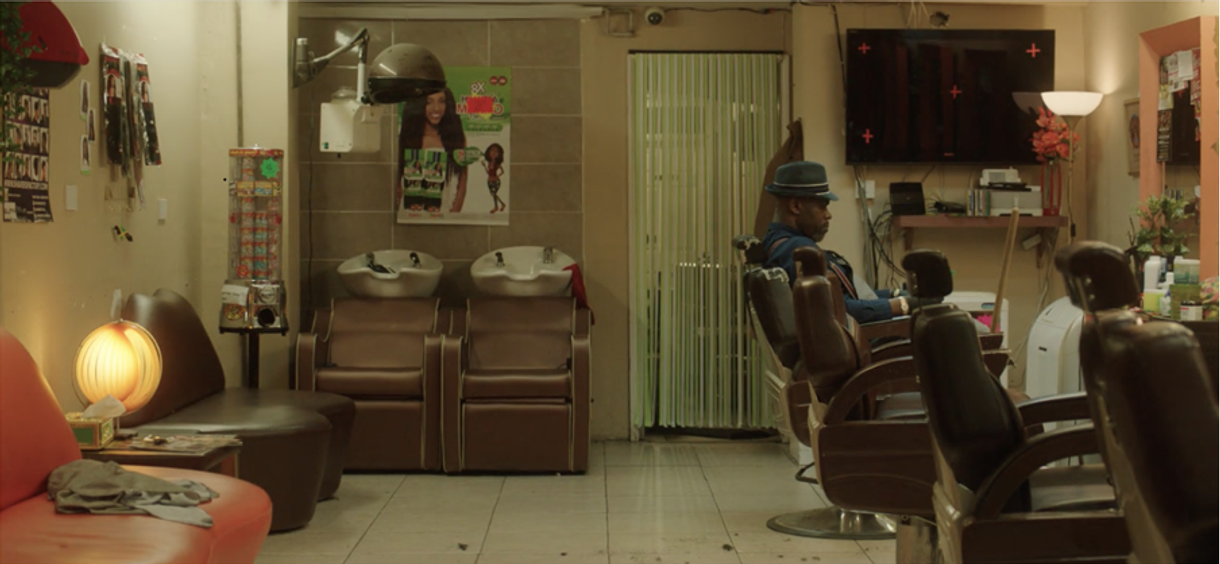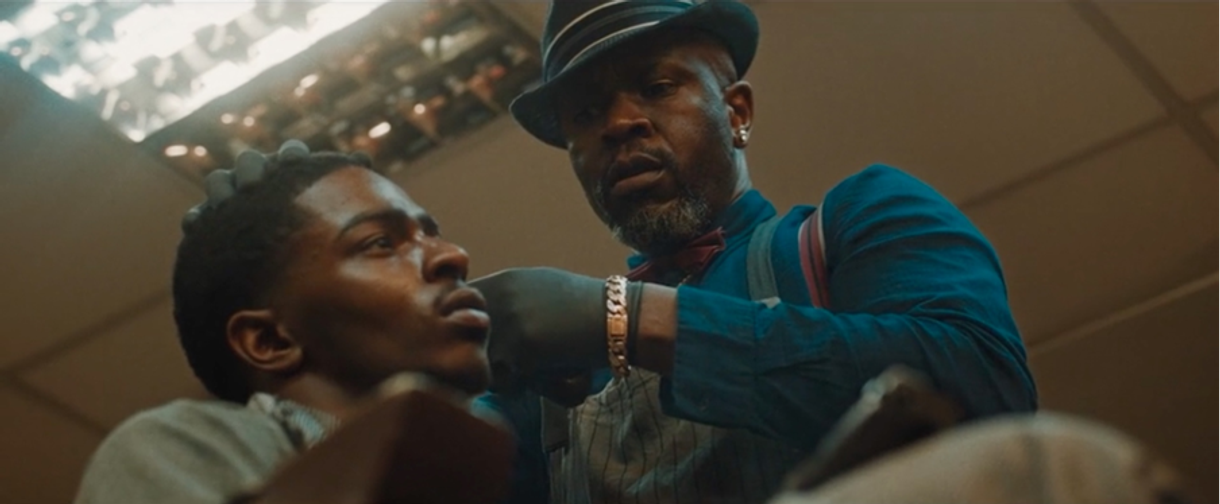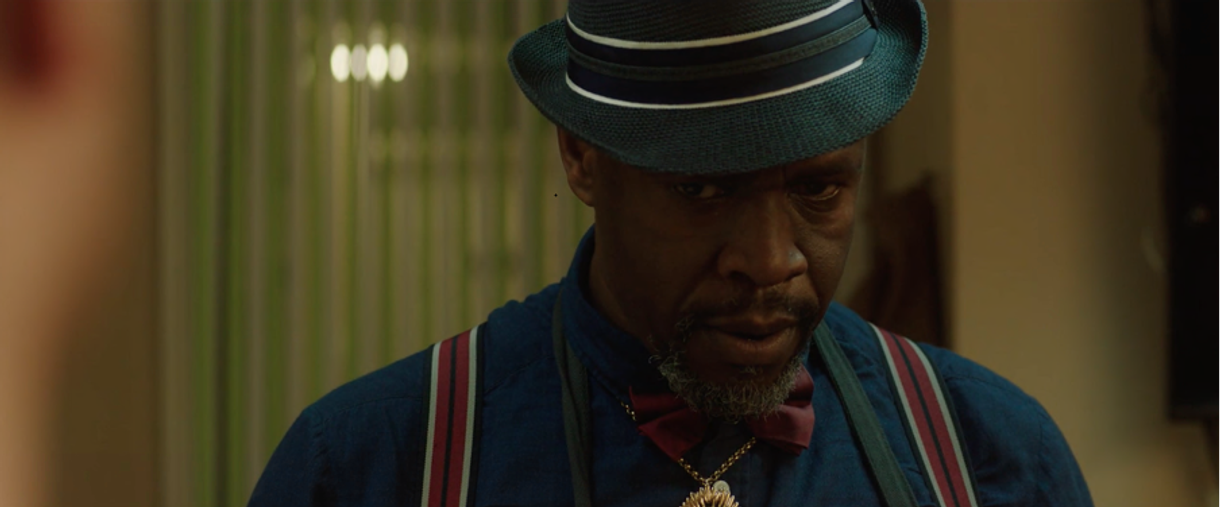News Story

We caught up with the creators of short film HAIRCUT who were commissioned in 2018 as part of the London Calling Scheme. Haircut was selected for the BFI London Film Festival and later launched online where it has gained over 750,000 views.
You can watch Haircut here.
Writer/Director Koby Adom and Producer Joy Gharoro-Akpojotor have now gone on to achieving remarkable steps in their careers. Here's what they both had to say:
What was your journey into the film industry like?
Koby Adom (Director/Writer): Like you would expect. It started off difficult because it was unrealistic for someone like me to be a film director. Even I didn’t fully believe in myself initially, but I had a burning desire, which always felt difficult to ignore.
Studying at the London Film School was one of the main blessings/turning points. It gave me the opportunity to learn by making mistakes but most importantly, it led me to a place of self-belief and confidence which I still rely on today in all of my work. I am a strong believer that before anyone else believes in you, you have to believe in yourself.
Graduating from the London Film School and being released into the wilderness was when I had to start relying on my confidence in filmmaking. I didn’t know many people in the industry and the few I did know were very successful people who had already blessed me with invaluable time during my development in Film School. This left me quite isolated but also very low and frustrated because the burning desire to create just kept growing but I wasn’t getting any opportunities to feed it any further until I was selected for the Modern Tales feature film development programme. This gave me a chance to sharpen my story telling skills to match my knowledge of filmmaking attained from film school.
In hindsight that period of time between graduating from LFS and making Haircut was my time for further development as a filmmaker but also as a person. It was a time that humbled me greatly but also allowed me to begin letting go of the reality I grew up with while rewriting a new one. After Haircut, all the hard work, rejections, endless hours paid off as I was given my first broadcast credit with the confidence I started off with while still maintaining the burning desire to do more.
Joy Gharoro-Akpojotor (Producer): My journey has been hard and good at the same time, but I think that’s most things. I made a couple of no-budget feature films and some shorts all outside of the “industry”. I made a film called White Colour Black in 2016 which really got me noticed in the industry and landed me a mentor in Ben Roberts, current CEO of the BFI. And that was around the same time I met Koby. So, it’s been an up and down journey - mainly born from just consistently making work despite anything else.
What is Haircut about?
Koby Adom: On the surface Haircut is about a barber who dreams of leaving his neighbourhood to pursue a music career, but his bubble is burst by a young boy who holds up his barbershop at gunpoint. However, at its core, Haircut highlights that purpose and fulfilment isn’t always wrapped in glitz and glamour. A lot of the time, it is the simple and inconspicuous paths in life which have the most purpose. There was no better way to celebrate this story than to play it through the eyes of a barber who is usually a pillar in a lot of black communities in the UK and beyond.

How did you and Koby meet and establish your Producer/Director working relationship? As a Producer what drew you to the script?
Joy Gharoro-Akpojotor: I met Koby when he put a call out for a producer for his graduation project from LFS called House Girl. The reason I had responded to the call out at the time was because I liked the idea he had and I watched his previous short, so I could see there was something in the way he approached his work - I’ve always told Koby that he was a certain level of gentleness that he holds his characters with which I appreciate. House Girl was definitely where we established our relationship, just in terms of learning each other and understanding how we can work together. We had so many arguments during that film, but also, we had a lot of beautiful, honest moments too. I think part of the reason why our relationship works is because we’re not afraid to be vulnerable and honest with each other, and through that you find a lot of love for the other person. He’s like my younger brother so there are times he annoys the hell out of me, but most importantly there’s a lot of love there where we can also talk about how annoying we both are to each other.
Tell us about your experience with the Film London/ BFI NETWORK Short Film Team. What did you learn?
Koby Adom: The biggest lesson I learnt from Film London was to believe in my voice as a filmmaker. My time with Film London challenged me to re-educate myself to back up the ideas that my spirit was offering up. This is something I’ve held onto since and has been an invaluable tool of communication in the workplace.
Joy Gharoro-Akpojotor: I definitely learned how to be the bridge between execs and the talent - that was the training ground! I think in any situation where there are financiers, part of the producer’s job is to at times defend the talent’s decisions and also to help the talent understand where the financiers / execs are coming from as well. It’s a balancing act. In saying that I think Film London were great to work with, they really pushed and championed the project in a way that we weren’t expecting as well.

What was your creative process like? How did you get ready to make the film?
Koby Adom: Joy did a brilliant job of finding crew members to attach to the project who spent time with me during prep to inhale my thoughts and ideas and present them back to me. I started with a director’s pitch but also expanded over numerous meetings with each crewmember, which allowed us to etch the final details into our plans.
I also did a lot of watching films and TV shows. I binged on the ones that locked me in and allowed my spirit to download the way the stories were visually told which would help me refine my own style subconsciously.
Joy Gharoro-Akpojotor: Well, if Koby would have it his way - we would have shot the film over three days. But also he wanted a lot of things to happen, which meant that we could only afford to shoot the film over two days. For me in this situation, I knew I was putting him under a lot of pressure, and I wanted to take him out of this film school way of thinking and push him, which mean getting him a casting director, giving him a new team that would help to push him forward - listen we argued over a lot of these things, but in the end he (reluctantly) agrees that it was good for him. I think these things really help make Haircut into what it was, but also I knew what Koby was like as a director, and I felt that would help him really focus on what was needed - day 2 he turned up with a 100 shots and yeah I knew we were going to go through all of that.
How did you maintain a good Director/Producer working relationship on the project? What was one thing you appreciated about each other?
Koby Adom: Open communication! Even if there is an argument that needs to be had, everything needs to be laid out on the table. What myself and Joy used to do is dismiss each other during the argument but take on board each others’ points made after the war of words (sometimes haha). This has actually made Joy a very good friend of mine because I know I can trust her to say everything she feels at all times. It’s a comfortable safe space to operate in. That’s the level of transparency I want in all departments of my life, not just filmmaking. I think it’s such an important attribute for collaboration.
Joy Gharoro-Akpojotor: The Director / Producer relationship I always say is a marriage. You’re committed to this person and you have to know if you can wake up at 3am and answer their phone calls. In my case, I see it as a familial relationship, like I said he’s a younger brother to me which came out of being in tough situations - House Girl was rough, Haircut was a hard two days, and we made some great work. We’ve taken each other out for lunch, he’s spoiled me and vice versa - there’s appreciation and trust in each other. One of the things I appreciate about Koby is that he’s always there when you need him.
What was one challenge you faced on the project? This can be independently or as a team. How did you overcome it?
Koby Adom: Joy calling me up one day saying: “Hey Koby. You know the 15-page script you wrote? You are shooting that in two days”. Those were two of the most stressful days of my life to date, but I loved each and every second of it. Even the close shaves and the rushing added to the experience. It added such a layer of tension and intensity that shooting with no issues or pace could provide. Joy sensing that I could complete those two days (when it really should have been a 4-day shoot) was a production masterstroke because the last film we worked on together (House Girl, my London Film School grad project) was an obstacle course that we miraculously made it through. In hindsight I realise that it was great judgement, instincts and risk-taking, so hats off to you Joy. I want those two days back on the feature ;). Honestly though, after working on those two shorts, Joy made me realise I can deal with whatever situation I am put in and get results. That’s an important skill to have confidence in.
Joy Gharoro-Akpojotor: I think it was definitely shooting the film in two days - that was hard but credit to the team and to Koby as well for making it happen. On the final day when we were losing time, Koby and Joel really just started to fly and bounced off each other that made sure we got everything we needed.

HAIRCUT appears to cover some important subject matters about the black community. Can you share the issues you addressed? How does the film challenge the stereotypes seen in mainstream media? What was the significance behind the middle-aged man being a barber?
Koby Adom: Barbers are very popular people in the hood (or the good ones anyway). People come there to do more than cut their hair. It’s a community centre where numerous ethnicities come together to feel at home. Jimmy is a character with a dark past who has successfully turned it round. This is an important image to show, as the media prefer highlighting the misdemeanours of black men. People like Jimmy are heroes in their own right for the black community and should be knighted in my opinion. My barber Marcus has been cutting my hair since I was a teenager and he’s seen me transition into a grown man and a working professional. He has heard all my rants and stories over the years. I genuinely trust him with my life and I am sure he knows a lot about me (and everyone else he’s served for decades). He’s a father figure to many.
What was the reception like after you made the film? What kind of response did you get from the film festival scene and industry? What sort of opportunities came your way?
Koby Adom: I can honestly say since the Film London showcase in 2018, my life has never been the same. It was the day I could easily call the turning point in my career and life as a whole. I attracted representation from Independent Talent and was selected for many public industry press articles, which boosted my career massively. Within 3 months of the film’s completion, I was in a different country shooting a BBC 1 drama. Currently the film has 739k views online.
Joy Gharoro-Akpojotor: It was a great reception, people really loved the film - they can see the community in there, the humour but also the truth of these characters as well. This film definitely was a stepping stone towards me producing Blue Story.
How are you navigating the COVID-19 situation and keeping engaged and balanced?
Koby Adom: I am currently working through the pandemic at the moment, which is safe and COVID-friendly. All the protocols are followed with specialist personnel to make sure the rules are being stuck to. Outside of that, I do a lot of praying and chilling with my family. Spending time with my Dad, siblings, brother-in-law and my nephews always recharges me mentally from the draining nature of Covid19.
Joy Gharoro-Akpojotor: When lockdown started last year, I turned my focus to development, I was mainly finding new material and also working on previous things with writers and directors. Towards the end of the year I’ve been lucky enough to get back to filming. But to also help with balance, I’ve been seeing a well-being practitioner to make sure my mental is good and also exercising more, to make sure my physical health is good.
What advice would you give to other filmmakers embarking on making their film right now?
Koby Adom: Make the film you thought nobody would care about because the reality is, the stories that have been cared about from before are starting to feel repetitive. So, your idea is now fresh and original because no one would have given it a second look before. Learn how to tell stories properly and then tell those stories nobody else can because only you have been through it (or know someone close who has been through it). Enjoy!
You can learn more about the BFI NETWORK and the opportunities they provide for young filmmakers and production teams here. To hear about the latest opportunities first, sign up to our newsletter or follow us on Twitter.